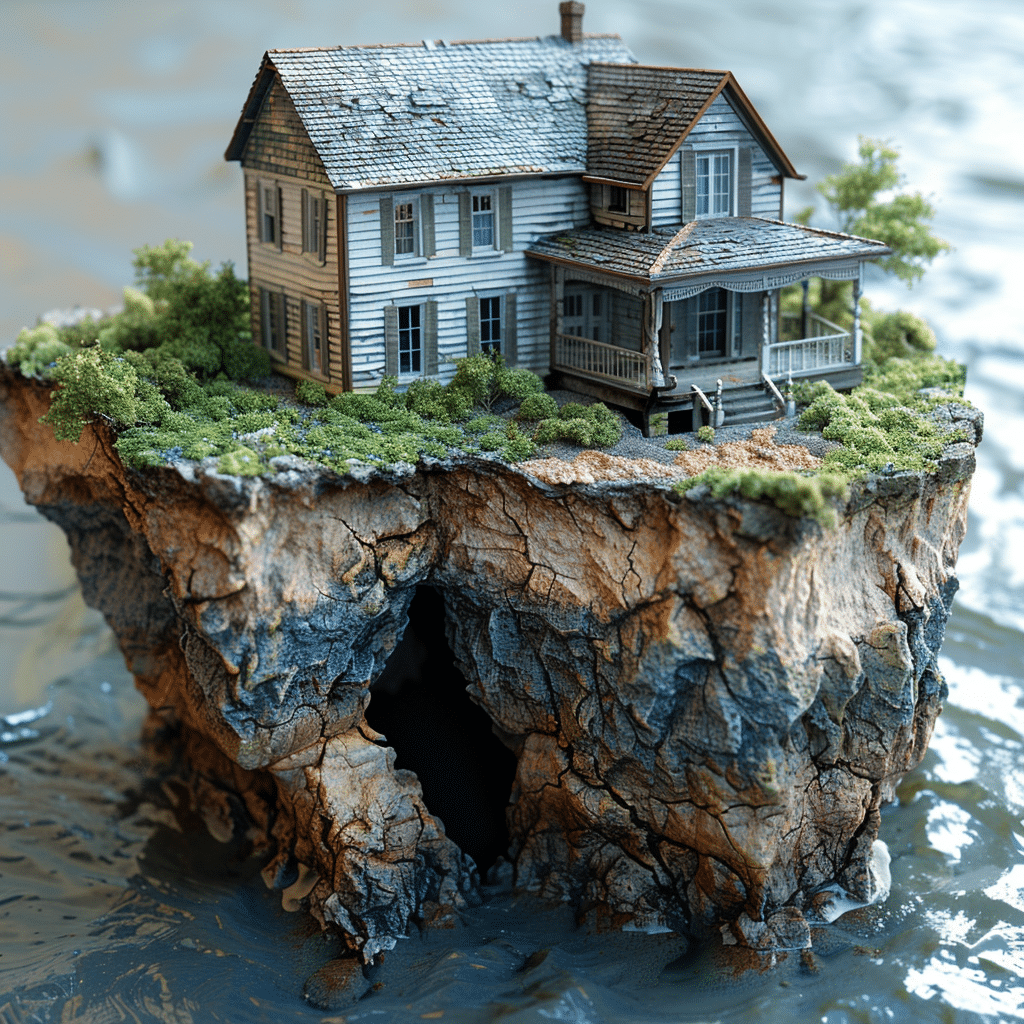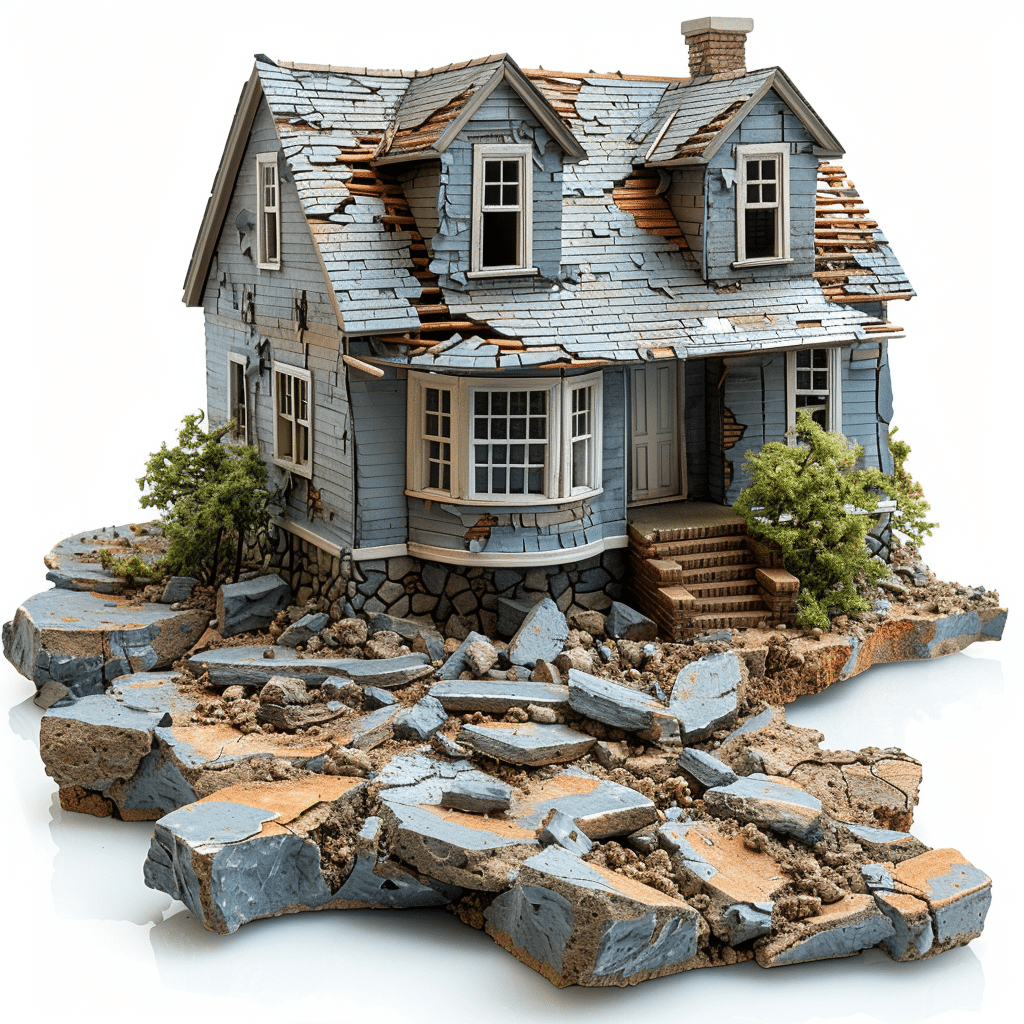The big question on everyone’s mind is, “Will the housing market crash?” Well, to get a handle on whether we’ll hit a snag in 2024, we need a layered approach. Let’s dive in, peeling back the layers like an onion to see what might be lurking underneath the shiny surface.

Examining Historical Trends: Have Housing Bubbles Led to Crashes Before?
Throughout history, housing bubbles have often ended in dramatic crashes. By delving into past events, we can catch early warning signs of an imminent real estate bubble. Take 2008, for instance — it’s a classic tale of boom turned bust.
In the early 2000s, banks like Lehman Brothers and Bear Stearns got a bit too generous with their lending. Housing prices soared to unsustainable levels. Fast forward to the crash; defaults piled up like dirty laundry, causing a financial cascade that shook global markets.
Now, compare that to today. The Federal Reserve is tightening the credit ropes, aiming to curb inflation. It’s like comparing apples to somewhat similar apples. But, what’s crucial here is understanding both the parallels and the distinctions.

Current Economic Indicators: Is the Housing Market Slowing Down?
Looking at various economic indicators, a pattern begins to form, suggesting the real estate market might be losing steam:
| Aspect | Current Status | Key Indicators | Possible Outcome | Details/Comments |
| Home Prices | Increasing, but at a slower pace | Year-over-year appreciation rates, affordability index | Possible stabilization or minor correction | Prices in many regions are still climbing but not at the rapid pace seen in previous years. |
| Mortgage Rates | Historically low, slight increase anticipated | Federal Reserve policy, bond market performance | Gradual increase in rates | Low rates have fueled demand, but any significant rate hikes could temper it. |
| Inventory Levels | Low inventory, slight increase recently | Months of supply of homes, new construction starts | Continued low inventory with gradual improvement | Shortage of homes has contributed to higher prices; new construction is slowly catching up. |
| Demand | High due to low rates and pandemic-driven needs | Buyer sentiment, demographic trends | Sustained demand or minor reduction | Millennials entering home-buying age and remote work flexibility have increased demand. |
| Economic Conditions | Mixed, with gradual recovery post-pandemic | Employment rates, GDP growth, consumer confidence | Steady growth or slight setback | Recovery from the pandemic is ongoing, but uncertainty remains due to variable job markets. |
| Foreclosure Rates | Historically low due to moratoriums | Policy changes, employment stability | Potential slight increase | Ending of foreclosure moratoriums may lead to a rise in foreclosures, but not dramatically. |
| Speculative Behaviors | Less speculative than in previous bubbles | Mortgage underwriting standards, investor activities | Stable market with reduced speculation | Stricter lending standards have prevented risky mortgage practices. |
| Government Policies | Supportive housing policies and stimulus measures | Federal aid programs, housing policies | Potential shifts in policy | Ongoing governmental support could help mitigate drastic market corrections. |
Expert Opinions: Is the Housing Market Going to Crash?
To get a clearer picture, let’s listen to some heavy-hitters in the real estate world.
Regional Differences: When is the Housing Market Going to Crash?
The anticipation of a crash might not be uniform across the board. Some regions are more volatile than others.
Comparing 2024 to Past Crises: When Will the Housing Market Crash Again?
By contrasting today’s scenario with past crises, we gain a vantage point:
Predictive Models: Will The Housing Market Crash in 2024?
Researchers at MIT’s Real Estate Innovation Lab are on the case. Using models that factor in employment rates, consumer debt, and macroeconomic policies, they estimate a 30% probability of a downturn in the next year. Key variables influencing this include inflation trends and fiscal decisions.
Market Dynamics: Real Estate Bubble vs. Natural Correction
Knowing the difference between a ballooning real estate bubble and a simple market correction is crucial.
Best Strategies for Homeowners and Investors: Preparing for Uncertainty
To brace for potential market shifts, consider these strategic moves:
The Road Ahead for the Housing Market
So, what’s the final takeaway for those asking, “Will the housing market crash?” The mix of historical context, present indicators, and expert opinions suggests we might see a correction rather than a full-blown crash. But who knows, the market’s as predictable as a cat, right?
By staying updated, diversifying investments, and locking in favorable terms now, you’ll be fortified. The road ahead looks bumpy. Brace yourself with the right knowledge and strategies, and you’ll ride out any real estate storm and emerge even stronger.
For more comprehensive insights, check out our detailed housing market Predictions or learn about what’s driving the market with pieces like the quirkiest bed in closet stories.
The housing market’s nature makes it dynamic and sometimes unpredictable, but staying vigilant and informed can turn potential challenges into insightful opportunities. Let’s see where 2024 takes us, one calculated step at a time.
Will The Housing Market Crash: Shocking Predictions
Unforgettable Twists in the Housing Market Saga
Ever wondered if the housing market is poised to crash? It’s a rollercoaster ride, and recent data has everyone talking. For instance, many folks think about when will house prices drop, often fearing a repeat of the 2008 crisis. But did you know that economic downturns can sometimes trigger unexpected market behaviors? Home prices can stagnate or even rise, bucking typical trends. And speaking of unexpected, who would’ve predicted the Baltimore Ravens’ Lamar Jackson tweet could stir up such economic chatter? Sports and economics intersect in remarkable ways, showing us that market predictions aren’t just about numbers.
Odd Connections and Market Anomalies
The housing market, believe it or not, shares quirky overlaps with other sectors. Take Derek Chauvin, whose trial’s media buzz created ripple effects on local economies. Disruptions in public trust can have diverse repercussions, such as shifts in property investments. Likewise, a seemingly unrelated phenomenon like the skyrocketing popularity of the One Piece box set can influence spending habits. People splurging on entertainment during uncertain times can be a telltale sign of market moods.
Surprising Trivia Alert!
Let’s hop into some intriguing trivia. Did you know the housing market often sees peculiar trends during high-profile trials? When someone like Lee Rodarte makes headlines, the resulting media frenzy can affect local real estate values. It’s peculiar but true! Buyers and sellers react emotionally, leading to spurts of activity or sudden freezes in the market. Whether you’re a real estate enthusiast or just love a good anecdote, these surprising connections keep things interesting.
Shocking predictions about the housing market crashing involve more than just economic factors—they intertwine with cultural moments and societal events. Next time you ponder will the housing market crash, remember that it’s a medley of the expected and the bizarre. And who knows? Maybe your next home’s fate is influenced by something as random as your favorite manga series.




